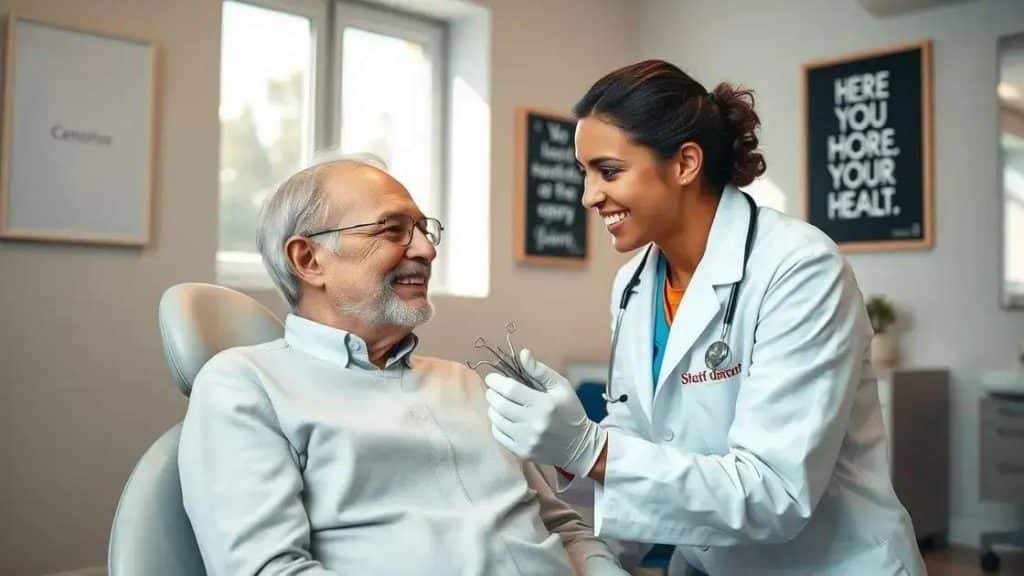State-funded dental programs for seniors: find the best options

State-funded dental programs for seniors provide essential dental services such as check-ups, cleanings, and fillings at little to no cost, based on eligibility criteria that include age and income level.
State-funded dental programs for seniors can make a significant difference in maintaining oral health. Have you ever wondered how these initiatives work and what services are offered? Let’s dive in and explore your options.
Understanding state-funded dental programs
Understanding state-funded dental programs is essential for seniors seeking affordable dental care. These programs aim to provide necessary services to older adults who may have limited income or no dental insurance. Let’s break down how these programs function and what they offer.
What are state-funded dental programs?
State-funded dental programs are initiatives created by government agencies to help seniors receive dental care they might not otherwise afford. They often cover a variety of services, including routine check-ups, cleanings, fillings, and sometimes even more extensive procedures such as dentures or extractions.
Eligibility criteria for dental assistance
Eligibility for these programs can vary by state, but many require participants to demonstrate some financial need. Key factors usually taken into account include:
- Age (typically 65 and older)
- Income level
- Residence in the state offering the program
- Availability of dental services in the area
Most importantly, always check with local agencies to understand the specific criteria in your area.
Many seniors feel overwhelmed when navigating healthcare options, but state-funded programs can provide essential support. By participating in these programs, seniors can maintain their oral health without the stress of high costs. Regular dental care is crucial as it helps prevent more serious health issues down the road.
How to apply for these programs
The application process can vary, but generally involves filling out a form and providing financial information. Here are some steps to consider:
- Contact local health department or senior services agency
- Gather necessary documentation (like income verification)
- Complete the application form provided by the agency
- Schedule an appointment for an evaluation, if required
Each state may have different resources available, making it important to seek help from local community organizations. With the right information, seniors can navigate the often-complicated landscape of dental care options.
Ultimately, understanding state-funded dental programs opens doors for seniors. By addressing common concerns and making services accessible, these initiatives encourage better overall health. Because oral health significantly impacts overall health, finding the right resources is vital to ensuring a healthy and fulfilling life.
Eligibility criteria for dental assistance

Understanding the eligibility criteria for dental assistance is a key step for seniors seeking state-funded dental programs. Different programs have varied requirements, but many focus on factors like age, income, and residency.
Age Requirements
Most programs cater specifically to seniors, generally targeting individuals who are 65 years and older. This age threshold is important as it recognizes the unique health needs that come with aging.
Income Limitations
Income plays a significant role in determining eligibility. Many state-funded dental programs require participants to demonstrate financial need. Common guidelines include:
- Income must fall below a specific threshold set by the state
- Verification of income may be necessary through documentation or tax returns
- Some programs may also consider assets, alongside income, to assess need
It’s essential to check local resources for specific income limits and documentation requirements.
Aside from age and income, residency is another criterion that cannot be overlooked. To be eligible, applicants must reside in the state offering the program. This ensures that the resources are allocated appropriately to those living within the service area.
Other Considerations
While age, income, and residency are primary factors, there may be additional considerations. Some programs have specific health requirements, prioritizing seniors with particular medical needs. Additionally, waiting lists are common, so exploring options well in advance is advised.
Knowing these eligibility criteria for dental assistance can empower seniors to make informed decisions about their dental care. With the right information, finding and applying for these valuable programs becomes easier.
Frequently asked questions about dental care for seniors
When it comes to frequently asked questions about dental care for seniors, understanding the common concerns can help alleviate worries and improve oral health. Many seniors have specific questions regarding their dental needs and available assistance programs.
What dental services are covered?
Most state-funded dental programs for seniors cover essential services, such as:
- Routine check-ups and cleanings
- Fillings for cavities
- Extractions if needed
- Dentures or partial dentures
It’s important to check the specific coverage details of each program, as offerings may vary.
Do I need to pay out-of-pocket?
One of the biggest concerns for seniors is potential out-of-pocket costs. Typically, state-funded programs aim to minimize these expenses. While some programs may require small co-pays, many services are provided at little to no cost. It is critical to inquire about any fees upfront.
How can I find a participating dentist?
Finding a dentist who accepts state-funded dental programs can be straightforward. Many states provide a list of participating dentists. Here are a few steps to assist in the process:
- Visit your state’s health department website
- Call local dental clinics to verify acceptance
- Ask for referrals from other seniors or community organizations
Having access to the right dental professionals can make a big difference in the quality of care received.
What if I have health conditions?
Many seniors worry about how health conditions may affect their dental care. Conditions such as diabetes or heart disease can impact oral health significantly. Seniors should always communicate their full medical history to their dentist, as this helps tailor care appropriately. Your dentist can offer guidance on how to manage your oral health effectively, depending on your specific health needs.
These frequently asked questions about dental care for seniors highlight the importance of being informed and seeking the help that is available. Knowing where to find answers can lead to better oral health and an overall improved quality of life.
How to apply for state-funded dental programs

Applying for state-funded dental programs can seem daunting, but understanding the steps involved can make the process straightforward. Knowing what to expect allows seniors to access the dental care they need.
Gather Necessary Documents
The first step in the application process is gathering required documents. Common documents include:
- Proof of age (such as a birth certificate or ID)
- Income verification (like pay stubs or tax returns)
- Proof of residency (such as a utility bill)
- Any relevant medical records that may affect dental care
Having these documents ready will streamline the application process.
Contact Local Resources
Once your documents are in order, the next step is to reach out to local resources. Most states have health departments or agencies that manage these programs. Here’s how to proceed:
- Visit your state’s health department website for information
- Call the local health agency to ask about the application process
- Visit community centers that often have information on available resources
These organizations can provide guidance and necessary forms to get started.
Complete the Application Form
After gathering the required documents and contacting the appropriate resources, it’s time to fill out the application form. Make sure to provide accurate and complete information. If you have questions while completing the form, don’t hesitate to seek assistance from a family member or a staff member at the health department.
Schedule an Interview or Evaluation
Depending on the program and state requirements, you may need to schedule an interview or evaluation after submitting your application. During this step, program staff may discuss your needs and determine eligibility. Being prepared for this meeting can make a significant difference. Bring all documentation and be ready to answer questions about your health and dental care needs.
Knowing how to apply for state-funded dental programs enables seniors to access essential care. By following these steps and being prepared, obtaining necessary dental services becomes much more achievable.
In summary, understanding how to access state-funded dental programs is crucial for seniors seeking affordable dental care. By knowing the eligibility criteria, asking the right questions, and following the application steps, seniors can successfully navigate these programs. The support available can significantly improve oral health and overall well-being, ensuring that seniors receive the care they require without undue financial strain. Taking the first step toward applying can lead to healthier smiles and a better quality of life.
FAQ – Frequently Asked Questions About State-Funded Dental Programs
What are state-funded dental programs?
State-funded dental programs offer dental care services to seniors at little or no cost based on eligibility criteria. They help those who may not have insurance or funds for dental care.
How do I know if I am eligible for these programs?
Eligibility typically depends on age, income level, and residency. Seniors usually must be 65 or older and demonstrate financial need.
What types of dental services can I receive?
Services often include routine check-ups, cleanings, fillings, extractions, and sometimes dentures, depending on the specific program.
What do I need to apply for state-funded dental programs?
You will need to gather documents like proof of age, income verification, and proof of residency to complete the application process.





